#vocoder
Text
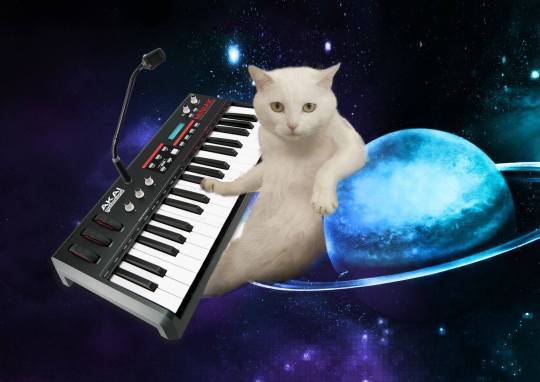
#cats on synthesizers in space#catsonsynthesizersinspace#cat#cats#synth#synthesizers#synthesizer#synths#space#cosmos#cosis#epic#funny#lolz#vocoder#caturday#planet#kitten#kittens#cute#catsofinstagram#cats of tumblr
236 notes
·
View notes
Photo

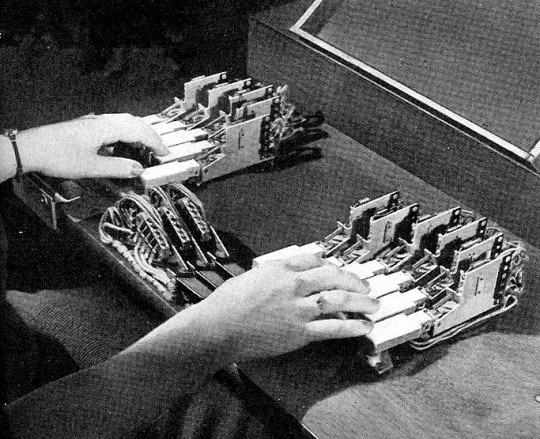
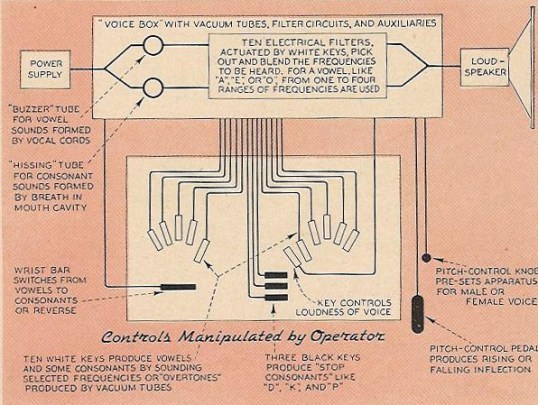

Homer Dudley - The Voder
“ The Voder was first unveiled in 1939 at the New York World Fair (where it was demonstrated at hourly intervals) and later in 1940 in San Francisco. There were twenty trained operators known as the ‘girls’ who handled the machine much like a musical instrument such as a piano or an organ, but they managed to successfully produce human speech during the demonstrations. ... This was done by manipulating fourteen keys with the fingers, a bar with the left wrist and a foot pedal with the right foot. “
cred: 120years.net/the-voder-vocoderhomer-dudleyusa1940
303 notes
·
View notes
Photo

"The mother of all transistorized vocoders, prototype of early 70s, custom built for german electronic duo kraftwerk of that period, documented by back cover photo of KW's album "Ralf & Florian" and in some part in the artwork on inside sleeve.
492 notes
·
View notes
Text
House of Leaves, 2001, and Daisy Bell (and why its not creepy)
(Fairly minor) Spoilers for House of Leaves by Mark Z. Danielewski and 2001: a Space Odyssey by Stanley Kubrick
About 500 pages into House of Leaves, Will Navidson begins falling. Alone in the twisting labyrinthine corridors of the House, he is alone, out of supplies, by all metrics thoroughly and definitively defeated. The floor suddenly disappears beneath him and he begins to fall. And there it is, vertically stark against the white page, as many lines are in this section, falling just as he is.
“Daisy. Daisy. Daisy. Daisy, Daisy, give me your answer do. I’m half crazy over the love of you. That’s not right.”
Daisy Bell was written in 1892 by composer Frank Dean under the pen name Harry Dacre. A relatively prolific composer at the time, he is thought to have written the song about Daisy Greville, the Countess of Warwick at the time, although evidence for this factoid is sketch at best, and the lyrics directly contradict this reading.
Daisy Bell is a very simple romance song that tells a very endearing story of a young couple’s romance, being unable to afford much more than the eponymous “bicycle built for two.” There’s also an often ignored line about how they will both “despise Policemen and lamps as well.” Even from a modern perspective this song feels really intimate and cute, expressing joy despite poverty, in the policemen line even expressing disgust at cops and urbanization without care for the environment.
Through a variety of circumstances, Daisy Bell, despite this global appeal, has become primarily associated with advances in computing, being the first song to be synthesized by a computer in 1961 on an IBM 7094, and references to this development persist.
The resilience of references to this accomplishment are remarkably popular, primarily due to Arthur C. Clarke and Stanley Kubrick’s 2001: a Space Odyssey in which the computer HAL 9000 sings the opening lines of the song as he is deactivated, calling back to the IBM demo, which Clarke himself had witnessed.
This rendition, and the original synthesized rendition are often described as creepy and off putting, but I find them strangely endearing. The original version represents a massive leap in computing, its few seconds of audio, and is extremely imperfect. The choice of Daisy Bell, and simple live song from a hundred years ago also helps to humanize the voice singing it.
HAL 9000’s rendition is pained, sung as he looses his memory and cognitive functions in what feels like an eternity, in both novel and film. HAL 9000 is a painfully sympathetic character for me. While in the film his intentions remain fairly ambiguous, in the novel they come from a conflict in his instructions, and how he chooses to navigate around those instructions, interpreting them extremely literally being a computer.
It is clear that the intention with the character was to present an uncanny valley human-like consciousness, but honestly a lot of the time it just reads like he’s on the spectrum. He speaks extremely deliberately with awkward pacing. He reflects, in many ways my own anxieties about being excluded, as-well as a very human survival instinct. He is a bad liar, and extremely trepidatious about the task he believes he has to do. He reads in many ways as I would expect a human to in a position of such intense responsibility.
Thus HAL 9000’s final song to me Isn’t creepy, its confirmation of just how human he is. It is, distinctly, something he asks to sing, he almost reads as excited to show it off. It is fitting that the last song he sings is the first song a computer ever sung. I care way more about HAL than I do any of the other characters in the movie, despite his atrocious actions. In many ways he seems the most human, and I think that was part of the point.
My favorite rendition of the song comes from this popular lineage of synthesized version. Tamachang’s Daisy Bell from Future Music With Future VOICES is hauntingly beautiful. Composed of three synthesized voices, that of IBM 7094, Vocoder, and Vocaloid 4 Cyber Diva, as a fusion of old and new, it’s genuinely a really beautiful piece. Each voice has its own unique qualities, all of which lend the song distinctly different emotion.
The narrative I like to imagine is one i have seen dozens of comments on the song mentioning, and stems from the fact that Cyber Diva sounds far more youthful than the other two. In this framing, it is a newer computer saying goodbye to her old relatives as they die, via singing an extremely human cheesy love-song with them.
All of these narratives around computers and Daisy Bell are a byproduct of our tendency to over-anthropomorphize computers.
House of Leaves, on the other hand, seeks to draw on themes completely unrelated to the long lineage of robotic Daisy Bells. My first thought when I saw the line in the novel, was of Navidson’s daughter, Daisy. I could see this having been a lullaby, sung to her as he put her to bed. I do not believe this reading to be the most compelling, however. The novel does not spend much time on Navidson’s children.
An often cited fact about the novel, and the Navidson record in particular is that its actually primarily a love story. I believe this to be a far more compelling understanding of the song’s conclusion. Will and Karen Navidson have been through hell together, and this song, sung when things seem darkest, as Navidson falls, as we latter understand, towards his wife, is the subtle confirmation, that despite everything they’ve been through, they will be ok.
House of Leaves, in general, is about, on some level, love (not just romantic) in the face of adversity, both through the lens of the Navidsons troubled reparation of their relationship, as well as Johnny’s slow collapse and our eventual understanding of his past. Daisy Bell is a perfect expression of the realization of these themes. That love can persist even when circumstances seem dire, and can in fact help you through those circumstances. A relatively simple message, but with many complexities
Thank you for entertaining my over-analysis :)
Fav Daisy Bell:
youtube
Original synthesized Daisy Bell:
youtube
Daisy Bell Hall 9000:
youtube
#house of leaves#2001 a space odyssey#literary analysis#book recommendations#daisy bell#vocaloid#ibm#ibm 7094#Hal 9000#will navidson#karen navidson#stanley kubrick#arthur c. clarke#mark z danielewski#cyber diva#vocaloid 4#vocoder#Youtube
25 notes
·
View notes
Photo
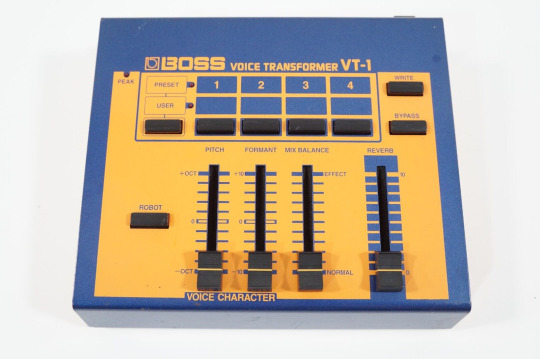


Boss VT-1 // Digital Voice Transformer FX Unit (1996)
361 notes
·
View notes
Text
Fungus Don't Cry | mudwerks
29 notes
·
View notes
Text
Suzanne Ciani - Liberator
Suzanne Ciani's full version edit of her intergalactic vocoder driven TV jingle for Atari’s classic Liberator arcade game. Originally proposed for a possible promotional flexi-disc.
41 notes
·
View notes
Text
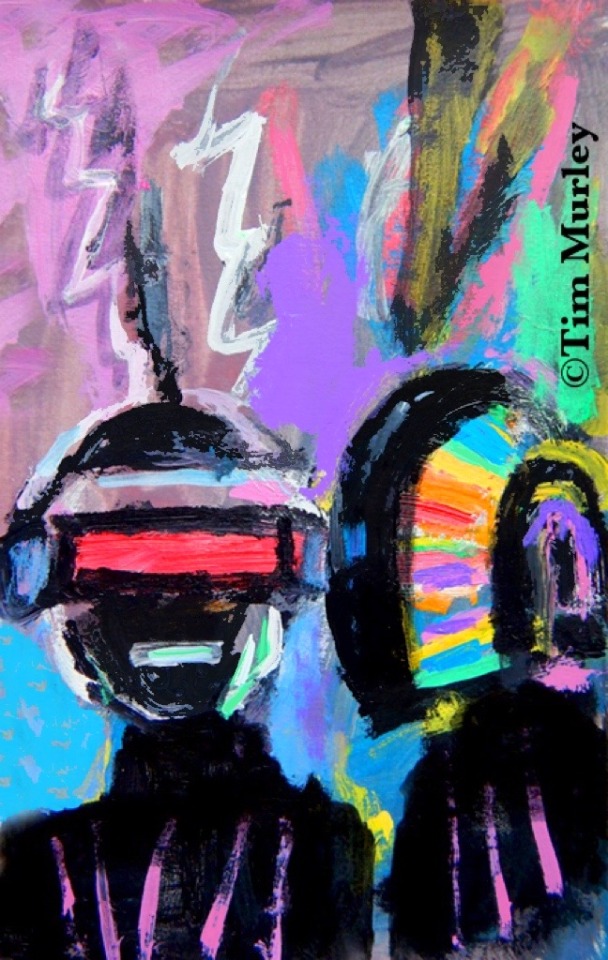
Better and stronger. 🤖🤖🟪🟥🟧🟩◼️🟨🟦🎵
#daft punk#robot rock#human after all#random access memories#vocoder#disco#giorgio moroder#house music#french house#progressive techno#progressive house#get lucky#tron evolution#tron#tron uprising#tron legacy#deadmau5#swedish house mafia#da funk#around the world#synthesizer#roland v drums#drum machine#edmlife#edm music#gig poster#vinyl art#mixtape cover#poster art#nile rodgers
241 notes
·
View notes
Text
youtube
Author>> genuinely one of my favorite versions of this song, been listening to it for years and I thought what if this was a thing for glitchtrap and the old William?
Like it starts the vocoder singing, William somewhat alive looking in his prison or something and a cartoon springbonnie crawls her/his/their way free out of his broken Jaw.
She sits up all confused while the vocoder is still singing, and jumps seeing a now dead body of William afton, symbolizing glitch has let his now useless body finally die and rot, at least in his eyes.
They see an old old cartoon fredbear when IBM704 starts to sing and tries to hug him, (maybe his past, maybe Henry's fredbear or Henry since the character wouldn't be tainted by the men's bitter enemy status) but his arms go through and he can't save his partner. Or redeem his past.
And then Cyber Deva (the actual vocaloid singing i just learned) sings, springbonnie himself dancing around the old room and waving goodbye to both of them as fredbear fades away, but his voice survives on as a memory. He takes off his old bow tie and brushes fed dust odd of himself (blood)
Near the end, during "I will stand by you in Wheel or woe, daisy, daisy!" Last bit, she uses a body bag to carry the now skeleton of William, and leaves it in a grave with their old star patterned jacket as a wreath, leaving the old William Afton to finally die. He takes off a ring and leaves it on the grave.
And she pierces his ear with some sparkly earrings, puts on some shimmery or cutesy overalls, adds a bow to his other ear, a new bow tie, and purple eyes.
The new one. No longer even using William as their old name. Springbonnie can be who they once were.
Not the bunnysuit he used in vr, still a little stuck on his old self, but this new look inside Vanessa's head. Springbonnie the glitch.
Springy.
Glitchy.
I just have this idea of glitchtrap, now free of his old body, immortal like he wanted, and loose in this world of insane technology would be different. Especially after who knows how any years of torture in UCN, I want that to have done something to him.
He's not the man he once was. And hopefully that's a good thing.
I love the idea of him being in awe of how different everything is and using all his new abilities to search the world for new things.
He's still a terrible person. He's possessing people and killed Jeremy and probably others. He's not redeemed.
But he's new.
#glamdad#shine post#my au#fnaf au#glamrock dad#fnaf security breach#fnaf ask blog#fnaf sb#asks open#glamrock father#glamrock freddy#glamfather#fnaf glitchtrap#vanny x glitchtrap#glitchtrap#springbonnie#spring bonnie#william afton#vocaloid#vocoder#daisy bell#Youtube#IBM704
11 notes
·
View notes
Text
Guys holy crap look at what I found
youtube
Skip to 3:53 and listen oh my gosh.
7 notes
·
View notes
Photo
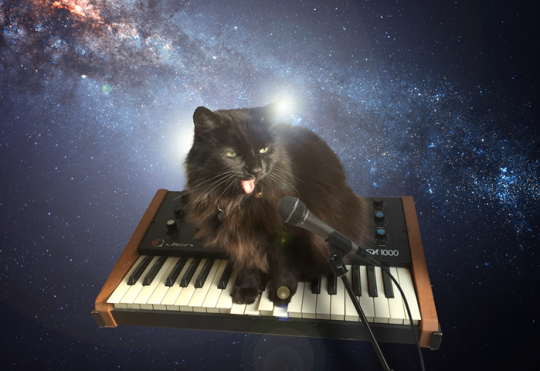
#cats on synthesizers in space#catsonsynthesizersinspace#cosis#cat#cats#synth#synths#synthesizer#synthesizers#space#cosmos#scifi#nasa#spacex#caturday#jensynth#vocoder#cute#epic#funny#lolz#astronomy#catsofinstagram#cats of tumblr
211 notes
·
View notes
Text
The Electro-Harmonix V256 vocoder.
33 notes
·
View notes
Text
i am become daft punk
just wanted to see if i could vocode good
inst by aeiouko / sunhatgirl on soundcloud (https://soundcloud.com/keep-smyling/bonus-intermission?in=keep-smyling/sets/conceptual-fnf-sans-week)
lyrics by the living tombstone
6 notes
·
View notes
Text
tumblr heard it first: i have a single coming out on april 19th
follow if u love imogen heap’s 2005 hit song “hide and seek” #vocoder
5 notes
·
View notes
Text
New music from me! 🌛
When life gets tough, I listen to Tom Waits records. Feels like I've been doing that a lot lately.
Thankfully, TOM WAITS IS THERE ✨
CHECK IT OUT ON BANDCAMP HERE
It's also got a Bandcamp exclusive TW cover... THE SYNTHESIZER'S DRINKING
And *gorgeous* artwork by exceptional human and artist @thebeefant 🎉
Greatly appreciate any checking out/reblogging etc 💝
#alpha chrome yayo#electro funk#vocoder#robots#vaporwave#city pop#jazz fusion#tom waits#retrowave#synthwave#synthesizer#lofi#lofi music#vhs aesthetic#vhs#vhs art#1990s television#90s tv#bandcamp#chillwave
49 notes
·
View notes
Text

Robot radio. 📻🤖🤖🟪⬛️🟩🟪🎵
#daft punk#marshmello#deadmau5#house music#french house#vocoder#disco#disco music#giorgio moroder#bee gees#edm music#robots#cyborg#tron legacy#tron#tron 1982#tron uprising#gig poster#synthesizer#drum machine#progressive house#futuristic#random access memories#get lucky#computer engineering#da funk#funk music#nile rodgers#chic#human after all
14 notes
·
View notes